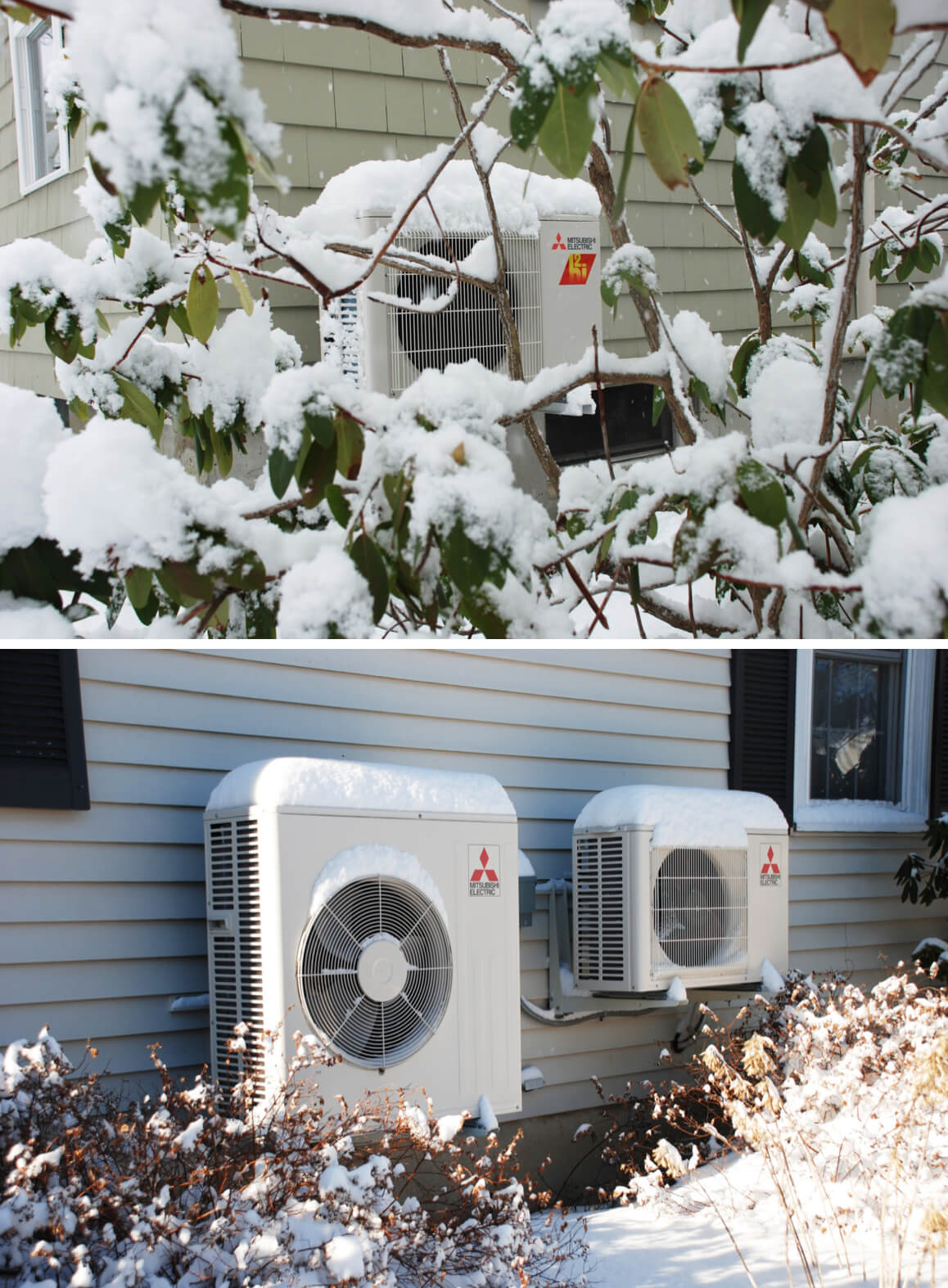This award category recognizes programs that take a comprehensive approach to replace a home's fossil fuel appliances and equipment with more efficient electric alternatives and to improve the energy efficiency of the building envelope (through weatherization). Home electrification upgrades may include heat pumps for space heating and cooling, heat pump water heaters, induction or radiant electric stoves, and electric vehicle chargers.
Leader of the Pack: Beneficial Electrification in Residential Buildings, Efficiency Maine; Maine
Program start year | 2012 |
Energy savings | Reduced consumption of oil and propane by more than 2.8 million gallons (oil equivalent) annually |
Number of participants | 25,865 participants in most recent year, 4.5% of Maine's 570,000 year-round dwellings |
Budget for most recent year | $55 million |
Program website | www.efficiencymaine.com/about-heat-pumps/ and www.efficiencymaine.com/about-heat-pump-water-heaters/ |
Link to most recent evaluation report |
Maine is an early leader in promoting the use of heat pumps in cold climates, largely by virtue of the efforts of Efficiency Maine's Beneficial Electrification program. Since 2013, more than 175,000 heat pumps for space heating have been rebated by Efficiency Maine, where one heat pump is equivalent to a single, mini-split heat pump. The Beneficial Electrification program also offers incentives for heat pump water heaters (HPWH), leading to substantial installations in the state. HPWH incentives are generally delivered midstream (i.e., to retailers and water heater distributors), providing instant discounts at the point of sale. By offering incentives that make HPWHs cost the same or less than baseline electric water heaters at the point of sale, this HPWH initiative has been able to achieve the best market penetration in the United States. Since its inception, this program has rebated over 70,000 HPWHs in Maine, a state with approximately 570,000 homes occupied year-round.
The program also uses a prescriptive, downstream approach with tiered incentives that directs the greatest savings toward low-income households. An Efficiency Maine contractor (CLEAResult) works with participating distributors and retailers. For the prescriptive channel, the program requires that eligible equipment be installed by "Residential Registered Vendors." For its significant advancement of heat pump installation, extensive contractor training and engagement, and financial incentives matched to different markets, Efficiency Maine's Beneficial Electrification in Residential Buildings program is a Leader of the Pack.
Key accomplishments and program features
- In 2019, the state legislature set a goal of installing 100,000 heat pumps by 2025 and surpassed the goal two years ahead of schedule.
- Early evaluation showed that ductless heat pumps worked very well in cold temperatures but struggled to meet their full potential when operating as a supplement to a primary furnace or boiler. In fall 2023, the program was modified to emphasize whole-home systems.
- Due to high volumes and competition, Efficiency Maine reports that the price of HPWHs to customers in Maine’s retail stores is the lowest in the U.S.
- The program braids multiple funding sources, such as the Regional Greenhouse Gas Initiative, New England Clean Energy Connect Settlement Funds, federal funds from the American Rescue Plan, and efficiency program funds from the electric utilities.
Exemplary Program: Residential Electrification Program, Mass Save®; Massachusetts
Program website | |
Link to most recent evaluation report | N/A |
The Mass Save® Residential Electrification program, sponsored by utilities and other program administrators in Massachusetts, encourages customers to electrify their one- to four-family residences by adopting electrification measures and energy-efficient products. The program is notable for its high budget, incentives and sales; extensive involvement of contractors; and efforts to target environmental justice (EJ) communities.
Key accomplishments and program features
- Since 2019, the program has supported the installation of heat pumps in 75,172 homes and businesses statewide, a large portion of which were installed alongside weatherization measures, reducing electric loads and bills.
- In 2023, over 9,500 low- and moderate-income customers’ homes were weatherized and nearly 2,800 heat pumps were installed with a program budget of $89 million.
- The program offers rebates, zero-interest loans, no-cost decarbonization consultations, and access to a network of pre-vetted and program-educated installers designed to fully support customers at every stage of their electrification journey.
- Incentives are available for a range of energy-efficient products such as heat pumps, heat pump water heaters, home appliances (including induction stoves and battery-powered lawn equipment); as well as for energy efficiency measures like insulation, and air sealing and electrical panel replacements.
- The program is marketed in partnership with local organizations and EJ communities.
Exemplary Program: Clean Heat Program, Con Edison; New York
Program website | |
Link to most recent evaluation report |
The Con Edison Clean Heat Program offers incentives to customers across all consumer segments to lower up-front costs and accelerate the deployment of heat pumps for space and water heating and other building electrification solutions. The program is notable for its focus on moving homes to fully electric heating without a fuel backup and for achieving a high participation rate in disadvantaged communities.
Key accomplishments and program features
- Through the end of 2023, the Con Edison Clean Heat Program had supported nearly 30,000 unique electrification projects, with over 30% of Clean Heat investment supporting projects and customers in disadvantaged communities.
- The program began in 2020 and currently has a $120 million annual budget.
- The Program also offers incentives for weatherization when it is paired with building electrification technologies in custom projects.
- The Program offers incentives to a wide range of heat pump technologies.
- All Con Edison electric customers are eligible for Clean Heat projects regardless of their gas service provider.
Exemplary Program: Fossil Fuel Free Homes, Elevate, Illinois
Program website | |
Link to most recent evaluation report | N/A |
Fossil Fuel Free Homes is an emerging program that has electrified over 400 single- and multi-family housing units across the Midwest with a focus on affordable housing and multifamily buildings.
Key accomplishments and program features
- Due to high service delivery costs, the removal of a gas bill alone saves over $500 a year annually for customers, particularly in Northern Illinois.
- Electrification retrofit packages including electric service upgrades, heat pumps, heat pump hot waters, heat pump dryers, and induction or electric stoves.
- The program braids philanthropic grants and utility funds to fully cover the cost of retrofits for homeowners and building owners.
Exemplary Program: Comfort Home, NYSERDA; New York
Program website | |
Link to most recent evaluation report | N/A |
NYSERDA’s Comfort Home is a “heat pump readiness” program that provides financial incentives toward the cost of building envelope upgrades to prepare homes for New York’s statewide transition to heat pumps. This program redefines the value of building envelope improvements for energy efficiency alone by re-casting these measures for their permanent load reduction benefits, demonstrating how these measures can reduce both upfront capital costs and operating costs for homeowners switching from fossil fuel to heat pumps, and contributing toward mitigating future winter peaking electricity demand at the grid level.
Key accomplishments and program features
- In 2023, the program installed more than 2,100 load reduction packages and facilitated nearly 150 heat pump installations after envelope upgrades.
- The program offers incentives for insulation, air sealing, and window packages to help make homes "heat pump ready."
- By encouraging efficiency first, homeowners can install smaller heat pumps (reducing the size of a heat pump by 1.5–2 tons of heating capacity) and reduce or eliminate the need for back-up heat when making the transition from fossil fuels.

